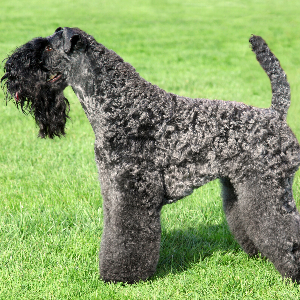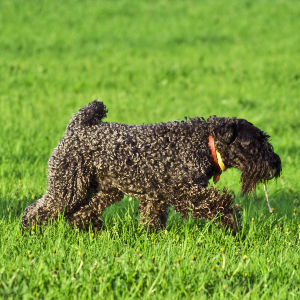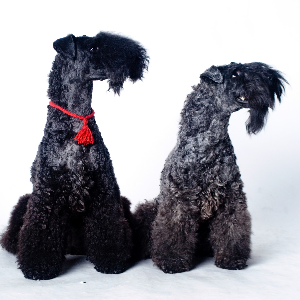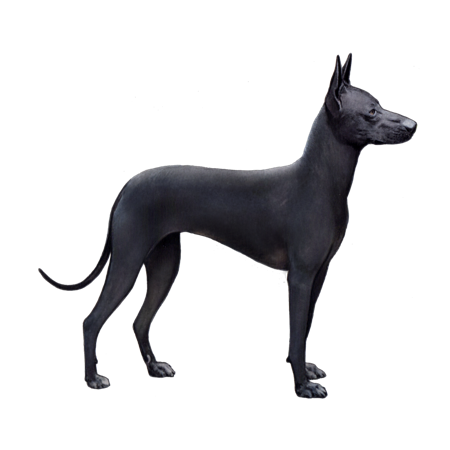
Kerry Blue Terrier
Kerry Blue Terriers are spirited, gentle, and active. These adaptable and versatile farm dogs are as happy to hang out at home as they are to put in a hard day's work. Loyal and very protective of family, the Kerry Blue Terrier makes a wonderful companion and pet.
Interested in discovering if your dog is a Kerry Blue Terrier?
Check out Wisdom Panel's DNA tests.

Kerry Blue Terrier Traits
General Appearance
Famous for its spectacular blue coat, this former farm breed is a smart-looking, comfortably-sized dog.
Coat and Coloring
The Kerry Blue Terrier's wiry coat is various shades of blue (gray). The color ranges from pale silver to deep slate. Kerry Blue puppies are born black and get lighter as they age—a process called clearing. These dogs may also have darker shading on their feet, heads, and tails.
Distinctive Physical Traits
The striking blue coat is a signature feature of this muscular breed. The Kerry Blue also sports a stylish beard, small V-shaped ears that fold forward, and dark eyes that complement its long head.
Kerry Blue Terrier Temperament
Kerry Blue Terriers are intelligent. But like many terriers, they have an independent streak. Though these dogs are known to be strong-headed and highly spirited, they're also loving and affectionate toward their families and very gentle with children.
Common behaviors to be aware of are chasing wildlife, barking, and digging. Because of their working dog backgrounds, Kerry Blue Terriers can be challenging to distract once they're engaged in an activity.


Kerry Blue Terrier History
Developed in County Kerry, the Kerry Blue Terrier is the national dog of Ireland. Its exact origins are a mystery, but legends abound.
According to one story, when only the Irish nobility was permitted to hunt with the Irish Wolfhound, peasants developed the Kerry Blue Terrier so they could poach. Some experts speculate that the Kerry was created by breeding the Irish Wolfhound with a basic terrier breed (an Irish Terrier or English Terrier).
Another tale proposes that Kerry Blue Terriers are the offspring of a Russian Blue Dog that swam ashore when a Russian ship wrecked in Tralee Bay in southwest Ireland. The Russian Blue Dog purportedly bred with local terriers to produce the Kerry Blue. A similar tale theorizes that the shipwreck was part of the Spanish Armada.
Though the true story of the breed's origins remains a mystery, one fact is indisputable: When it comes to faithfulness and friendliness, these dogs are legendary.
The Kerry Blue first appeared in a dog show in 1916. And the American Kennel Club recognized the breed in 1924.
Kerry Blue Terrier Care
Nutrition
The Kerry Blue Terrier requires a high-quality dog food that is appropriate for its age and activity level. It's important to monitor the amount of food you feed your Kerry Blue and reduce the portions if your pup gains weight. Also, remember that giving too many treats in addition to regular meals can contribute to obesity.
Grooming
Kerry Blue Terriers don't shed. But they still need to be brushed thoroughly every week. And combing their coats is essential to keep them from matting. When it's time for a trim, use clippers to cut the hair on the head, neck, ears, and belly and a pair of scissors for the coat.
Exercise
Active, spirited dogs, Kerry Blue Terriers like swimming and jogging. Exercise them enough outdoors, though, and they'll welcome calm family time inside the home. This breed also enjoys agility, earthdog trials, flyball, herding, hiking, retrieving, tracking, Frisbee, musical freestyle, rally, and competitive obedience.
Training
Kerry Blue Terriers can be stubborn. But that doesn't mean training is impossible—it just may be a bit more challenging. Kerry Blues respond well to reward-based training approaches. For example, offer their favorite treat as a reward for dropping an inappropriate item (such as your shoe) that they've retrieved.
Like all breeds do, Kerry Blue Terriers benefit from socialization and obedience training early on in life.

Kerry Blue Terrier Genetic Health Conditions
-
Degenerative Myelopathy
Degenerative Myelopathy (DM) is a neurological disorder, usually affecting dogs in their senior years. Loss of hind limb coordination is an early sign of disease, and as the condition progresses the hind limbs of affected dogs become increasingly weak.
-
Factor XI Deficiency
Factor XI Deficiency is a hereditary disorder that impacts blood clotting. The disease usually causes a mild, spontaneous bleeding disorder but more severe bleeding may occur following surgery. Many dogs that are at risk will not show any signs of disease.
-
von Willebrand's Disease, type 1
von Willebrand's Disease (vWD) Type 1 is a blood clotting disorder that typically causes mild bleeding tendencies although some affected dogs may have more severe signs. It is the result of low levels of von Willebrand's factor, a blood protein that helps stabilize blood clots.
Knowing if your Kerry Blue Terrier is a carrier or at-risk for these conditions can help you and your veterinarian plan for your pup’s lifelong care. With Wisdom Panel™ Premium, you can get results for over 200 genetic health tests.
Breed Group
Terrier
The Terrier Group ancestors were bred to hunt and kill vermin. They are often characterized as feisty and energetic dogs whose sizes range from fairly small to much larger.
Resources
https://www.akc.org/dog-breeds/kerry-blue-terrier/
Reviewed July 26, 2020 by Cindy Elston, DVM, MPH
































































